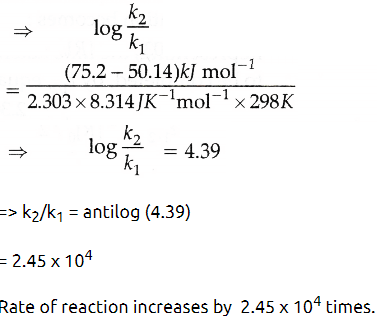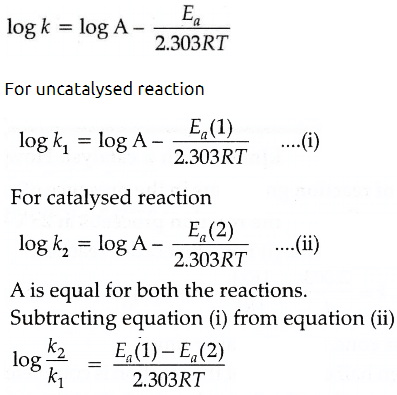Class 12 Exam > Class 12 Questions > The activation energy of a reaction is 75.2 k...
Start Learning for Free
The activation energy of a reaction is 75.2 kJ mol-1 in the absence of a catalyst and it lowers to 50.14 kJmol-1 with a catalyst. How many times will the rate of reaction grow in the presence of a catalyst if the reaction proceeds at 25°C ?
Verified Answer
The activation energy of a reaction is 75.2 kJ mol-1 in the absence of...
According to Arrhenius equation,




 This question is part of UPSC exam. View all Class 12 courses
This question is part of UPSC exam. View all Class 12 courses
Most Upvoted Answer
The activation energy of a reaction is 75.2 kJ mol-1 in the absence of...
Calculation of Rate Enhancement with Catalyst
- The rate of a reaction is given by the Arrhenius equation:
k = A * e^(-Ea / RT)
- Where:
k = rate constant
A = pre-exponential factor
Ea = activation energy
R = gas constant (8.314 J/mol-K)
T = temperature in Kelvin
Rate of Reaction without Catalyst
- For the reaction without a catalyst:
Ea = 75.2 kJ/mol = 75,200 J/mol
T = 25°C = 298 K
k1 = A * e^(-75200 / (8.314 * 298))
k1 = A * e^(-31.84)
Rate of Reaction with Catalyst
- For the reaction with a catalyst:
Ea' = 50.14 kJ/mol = 50,140 J/mol
k2 = A * e^(-50140 / (8.314 * 298))
k2 = A * e^(-21.26)
Comparison of Rates
- The rate enhancement due to the catalyst can be calculated as:
Rate enhancement = k2 / k1
= (A * e^(-21.26)) / (A * e^(-31.84))
= e^(10.58)
≈ 370
Explanation
- The rate of reaction will grow by approximately 370 times in the presence of a catalyst at 25°C. This is due to the lower activation energy provided by the catalyst, which allows more molecules to overcome the energy barrier and participate in the reaction. As a result, the reaction proceeds faster with the catalyst compared to without it. This significant rate enhancement demonstrates the importance of catalysts in accelerating chemical reactions.

|
Explore Courses for Class 12 exam
|

|
Similar Class 12 Doubts
The activation energy of a reaction is 75.2 kJ mol-1 in the absence of a catalyst and it lowers to 50.14 kJmol-1 with a catalyst. How many times will the rate of reaction grow in the presence of a catalyst if the reaction proceeds at 25°C ?
Question Description
The activation energy of a reaction is 75.2 kJ mol-1 in the absence of a catalyst and it lowers to 50.14 kJmol-1 with a catalyst. How many times will the rate of reaction grow in the presence of a catalyst if the reaction proceeds at 25°C ? for Class 12 2024 is part of Class 12 preparation. The Question and answers have been prepared according to the Class 12 exam syllabus. Information about The activation energy of a reaction is 75.2 kJ mol-1 in the absence of a catalyst and it lowers to 50.14 kJmol-1 with a catalyst. How many times will the rate of reaction grow in the presence of a catalyst if the reaction proceeds at 25°C ? covers all topics & solutions for Class 12 2024 Exam. Find important definitions, questions, meanings, examples, exercises and tests below for The activation energy of a reaction is 75.2 kJ mol-1 in the absence of a catalyst and it lowers to 50.14 kJmol-1 with a catalyst. How many times will the rate of reaction grow in the presence of a catalyst if the reaction proceeds at 25°C ?.
The activation energy of a reaction is 75.2 kJ mol-1 in the absence of a catalyst and it lowers to 50.14 kJmol-1 with a catalyst. How many times will the rate of reaction grow in the presence of a catalyst if the reaction proceeds at 25°C ? for Class 12 2024 is part of Class 12 preparation. The Question and answers have been prepared according to the Class 12 exam syllabus. Information about The activation energy of a reaction is 75.2 kJ mol-1 in the absence of a catalyst and it lowers to 50.14 kJmol-1 with a catalyst. How many times will the rate of reaction grow in the presence of a catalyst if the reaction proceeds at 25°C ? covers all topics & solutions for Class 12 2024 Exam. Find important definitions, questions, meanings, examples, exercises and tests below for The activation energy of a reaction is 75.2 kJ mol-1 in the absence of a catalyst and it lowers to 50.14 kJmol-1 with a catalyst. How many times will the rate of reaction grow in the presence of a catalyst if the reaction proceeds at 25°C ?.
Solutions for The activation energy of a reaction is 75.2 kJ mol-1 in the absence of a catalyst and it lowers to 50.14 kJmol-1 with a catalyst. How many times will the rate of reaction grow in the presence of a catalyst if the reaction proceeds at 25°C ? in English & in Hindi are available as part of our courses for Class 12.
Download more important topics, notes, lectures and mock test series for Class 12 Exam by signing up for free.
Here you can find the meaning of The activation energy of a reaction is 75.2 kJ mol-1 in the absence of a catalyst and it lowers to 50.14 kJmol-1 with a catalyst. How many times will the rate of reaction grow in the presence of a catalyst if the reaction proceeds at 25°C ? defined & explained in the simplest way possible. Besides giving the explanation of
The activation energy of a reaction is 75.2 kJ mol-1 in the absence of a catalyst and it lowers to 50.14 kJmol-1 with a catalyst. How many times will the rate of reaction grow in the presence of a catalyst if the reaction proceeds at 25°C ?, a detailed solution for The activation energy of a reaction is 75.2 kJ mol-1 in the absence of a catalyst and it lowers to 50.14 kJmol-1 with a catalyst. How many times will the rate of reaction grow in the presence of a catalyst if the reaction proceeds at 25°C ? has been provided alongside types of The activation energy of a reaction is 75.2 kJ mol-1 in the absence of a catalyst and it lowers to 50.14 kJmol-1 with a catalyst. How many times will the rate of reaction grow in the presence of a catalyst if the reaction proceeds at 25°C ? theory, EduRev gives you an
ample number of questions to practice The activation energy of a reaction is 75.2 kJ mol-1 in the absence of a catalyst and it lowers to 50.14 kJmol-1 with a catalyst. How many times will the rate of reaction grow in the presence of a catalyst if the reaction proceeds at 25°C ? tests, examples and also practice Class 12 tests.

|
Explore Courses for Class 12 exam
|

|
Signup for Free!
Signup to see your scores go up within 7 days! Learn & Practice with 1000+ FREE Notes, Videos & Tests.














